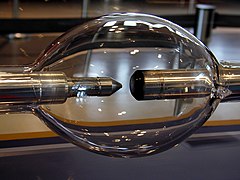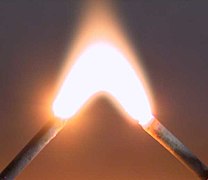Portal:Physics
| Physics Portal Main Page | Physics Textbook | Wikiprojects and things to do |
The Physics Portal

Physics (from Greek φυσική (ἐπιστήμη), i.e. "knowledge of nature", from φύσις, physis "nature"), is the natural science that involves the study of matter (anything that has mass and occupies space) and its motion (movement from place to another) through space and time, light and its propagation, along with related concepts such as energy and force. More broadly, it is the general analysis of nature, conducted in order to understand how the universe behaves.
Physics is one of the oldest academic disciplines, perhaps the oldest through its inclusion of astronomy. Evidence exists that the earliest civilizations dating back to beyond 3000 BCE, such as the Sumerians, Ancient Egyptians, and the Indus Valley Civilization, all had a predictive knowledge and a very basic understanding of the motions of the Sun, Moon, and stars. Although originally part of other physical sciences and mathematics, Physics emerged to become a unique modern science during the Scientific Revolution of the 16th century.
Physics is both significant and influential, in part because advances in its understanding have often translated into new technologies, but also because new ideas in physics often resonate with other sciences, mathematics, and philosophy. For example, advances in the understanding of electromagnetism or nuclear physics led directly to the development of new products which have dramatically transformed modern-day society (e.g., television, computers, domestic appliances, atomic power, and nuclear weapons); advances in thermodynamics led to the development of motorized transport and advances in aviation engineering; and advances in mechanics inspired the development of calculus.
Physics also has philosophical implications. It can be historically traced back to ancient Greek philosophy. From Thales' first attempt to characterize matter to Democritus' deduction that matter ought to reduce to an invariant state, the Ptolemaic astronomy of a crystalline firmament, and Aristotle's book Physics, different Greek philosophers advanced their own theories of nature. Well into the 18th century, physics was known as "Natural philosophy". By the 19th century, physics was realized as a positive science and a distinct discipline separate from philosophy and the other sciences. Physics, as with the rest of science, relies on philosophy of science to give an adequate description of the scientific method.
Selected article
Below are links to pages that are rated "Good Article" within WikiProject Physics from letters "A" through "L". The small good article icon (![]() ), which can be found on the top right corner of a rated Wikipedia page, symbolizes content held to a high standard on Wikipedia, although these have not reached Featured Article status.
), which can be found on the top right corner of a rated Wikipedia page, symbolizes content held to a high standard on Wikipedia, although these have not reached Featured Article status.
 Luis Walter Alvarez
Luis Walter Alvarez Astronomy
Astronomy Atomic theory
Atomic theory Robert Bacher
Robert Bacher Hans Bethe
Hans Bethe Bicycle and motorcycle dynamics
Bicycle and motorcycle dynamics Black hole
Black hole Niels Bohr
Niels Bohr Max Born
Max Born Norris Bradbury
Norris Bradbury Celestial spheres
Celestial spheres James Chadwick
James Chadwick Clapotis
Clapotis Arthur Compton
Arthur Compton Condensed matter physics
Condensed matter physics Edward Condon
Edward Condon Charles Critchfield
Charles Critchfield Marie Curie
Marie Curie Cyclone
Cyclone Deep Impact (spacecraft)
Deep Impact (spacecraft) Diffusion damping
Diffusion damping Dirac delta function
Dirac delta function Dynamics of the celestial spheres
Dynamics of the celestial spheres Ecliptic
Ecliptic Albert Einstein
Albert Einstein Electricity
Electricity Ronald Fedkiw
Ronald Fedkiw Enrico Fermi
Enrico Fermi Force
Force Frog battery
Frog battery Klaus Fuchs
Klaus Fuchs Galileo Galilei
Galileo Galilei Geothermal energy
Geothermal energy Josiah Willard Gibbs
Josiah Willard Gibbs John T. Hayward
John T. Hayward Hilbert space
Hilbert space Interferometry
Interferometry Kilogram
Kilogram Hilde Levi
Hilde Levi Liquid crystal
Liquid crystal
Selected picture
An arc lamp or arc light is a lamp that produces light by an electric arc (also called a voltaic arc). The carbon arc light, which consists of an arc between carbon electrodes in air, invented by Humphry Davy in the early 1800s, was the first practical electric light. It was widely used starting in the 1870s for street and large building lighting until it was superseded by the incandescent light in the early 20th century. It continued in use in more specialized applications where a high intensity point light source was needed, such as searchlights and movie projectors until after World War II.
-
The 15 kW xenon short-arc lamp used in the IMAX projection system
-
A mercury arc lamp from a fluorescence microscope
-
A krypton long arc lamp (top) is shown above a xenon flashtube. The two lamps, used for laser pumping, are very different in the shape of the electrodes, in particular, the cathode, (on the left).
-
A krypton arc lamp during operation.
-
An electric arc, demonstrating the “arch” effect
Did you know...
Physics 1
Physics 2
Physics 3
Physics 4
Physics 5
Physics 6
Physics 7
Physics 8
Physics 9
Physics 10
Physics 11
Physics 12
Physics 13
Physics 14
Physics 15
Physics 16
Physics 17
Physics 18
Physics 19
Physics 20
Physics 21
Physics 22
Physics 23
Physics 24
Physics 25
May anniversaries
- May 1, 1960 - U-2 spy plane shot down
- May 6, 1937 - Hindenburg fire
- May 9, 1012 BC – Solar Eclipse seen at Ugarit, 6:09–6:39 PM.
- May 9, 1904 – City of Truro, a steam locomotive exceeds 100 mph (160 km/h).
- May 10, 1946 – V-2 rocket's first successful launch at White Sands Proving Ground
- May 10, 1960 – The nuclear submarine USS Triton completes Operation Sandblast, the first underwater circumnavigation of the earth.
- May 11, 1862 – American Civil War: The ironclad CSS Virginia is scuttled in Virginia.
- May 11, 1995 – In New York City, over 170 countries extend Nuclear Nonproliferation Treaty indefinitely, without conditions.
- May 11, 1998 – India conducts three underground nuclear tests, including a thermonuclear device.
- May 14, 2018 - Ennackal Chandy George Sudarshan died.
- May 16, 1960 - Theodore Maiman operates the first optical laser, at Hughes Research Laboratories in Malibu, California.
- May 16, 1969 – Venera 5, a Soviet spaceprobe, lands on Venus.
- May 17, 1865 – The International Telegraph Union is established.
- May 18, 1974 - India conducts underground nuclear tests, named Smiling Buddha.
- May 18, 1998 - Microsoft sued by US Government
- May 19, 1943 - RAF uses bouncing bombs in combat
- May 20, 1932 - Amelia Earhart crosses Atlantic Ocean
- May 26, 1972 - President Nixon and Leonid Brezhnev sign nuclear weapon non-proliferation pact.
- May 24, 1844 - First official telegraph message is sent by Samuel Morse.
- May 27, 1937 - Grand opening, Golden Gate Bridge
- May 28, 1998 – Pakistan conducts five underground nuclear tests, named Chagai-I.
Births
- May 6, 1872 - Willem de Sitter, physicist, mathematician, and astronomer
- May 9, 1931 – Vance Brand, astronaut
- May 10, 1746 – Gaspard Monge, mathematician
- May 10, 1788 – Augustin-Jean Fresnel physicist
- May 10, 1963 – Lisa Nowak, astronaut
- May 11, 1918 – Richard Feynman, physicist
- May 14, 1686 - Gabriel Fahrenheit, physicist and engineer
- May 21, 1921 - Andrei Sakharov, nuclear physicist
Deaths
- May 10, 1482 – Paolo dal Pozzo Toscanelli, mathematician and astronomer
- May 16, 1830 – Joseph Fourier, French scientist
- May 17, 1916 – Boris Borisovich Galitzine, Russian physicist
Things you can do
Summary
- Edit a physics article
- Whether you are an expert or a novice, be bold, improve an article by editing it. Practice in the sandbox if you must. But hurry back to fix that glaring error that has been bothering you.
- Join WikiProject Physics.
- Watch the WikiProject Physics talk page for physics-related issues on Wikipedia.
- Improve Physics Portal.
- Add to Did you know and upcoming anniversaries.
- Add new Selected articles and Selected pictures to the queues.
- Add to Physics news.
- Review articles
- Assign importance and quality to unassessed articles (See Physics quality control)
- Review an article for techno babble and report confusing sections in articles talk page. (Give enough detail to help the editors.)
- Advanced Editing
- Expand a physics stub.
- Fix a page needing attention: Modern physics, Classical physics and other physics topics.
- Create a requested article.
- Add a requested image.
- Check out other physics-related WikiProjects: WikiProject Science, WikiProject Fluid dynamics, WikiProject Elements.
Check list for physics novices and experts new to wikipedia
- Edit a physics article
- Whether you are an expert or a novice, be bold, improve an article by editing it. Practice in the sandbox if you must. But hurry back to fix that glaring error that has been bothering you.
- Register with Wikipedia for a user name. (See the username policy)
- Visit the help page
- Add articles to your watch list.
- Check your watchlist on regular basis
- Revert an obvious vandalism edit
- Remove unnecessary jargon.
- Edit your user page to tell Wikipedia enough about you to help other editors get to know you
- Review an article and make a useful comment on the talk page
- Add your name to the WikiProject Physics members list
Activities for physics novices and experts familiar with wikipedia
- Edit a physics article
- Add your name to the WikiProject Physics members list
- Revert Vandalism
- Add or improve diagrams and figures
- Assign importance and quality to unassessed articles (See Physics quality control)
- Review article for techno babble and suggest areas that need improving on talk page (or add clean up tag.)
- Review, nominate, or submit a physics education article in Wikiversity:Second Journal of Science
- Fix a page needing attention
Related portals
Associated Wikimedia
The following Wikimedia Foundation sister projects provide more on this subject:
-
Commons
Free media repository -
Wikibooks
Free textbooks and manuals -
Wikidata
Free knowledge base -
Wikinews
Free-content news -
Wikiquote
Collection of quotations -
Wikisource
Free-content library -
Wikispecies
Directory of species -
Wikiversity
Free learning tools -
Wikivoyage
Free travel guide -
Wiktionary
Dictionary and thesaurus















